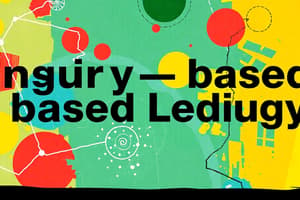Podcast
Questions and Answers
Which activity is a practical application of inquiry in a real-world scenario?
Which activity is a practical application of inquiry in a real-world scenario?
- Conducting a panel discussion on a current local issue. (correct)
- Reading a fictional novel for leisure.
- Following a recipe to bake a cake.
- Memorizing historical dates for an exam.
What is the primary aim of research, according to the definitions provided?
What is the primary aim of research, according to the definitions provided?
- To promote personal opinions.
- To compile existing information.
- To advocate for specific viewpoints.
- To discover answers to specific questions. (correct)
What is the common thread that ties together the various definitions of research?
What is the common thread that ties together the various definitions of research?
- The unsystematic collection of data.
- The use of complex statistical analysis.
- A quest for undiscovered truth. (correct)
- A reliance on personal opinions.
Which of the following best summarizes the benefits of research for students?
Which of the following best summarizes the benefits of research for students?
How does the 'cyclical' characteristic manifest in the research process?
How does the 'cyclical' characteristic manifest in the research process?
How does ensuring 'accurate' data in research contribute to the integrity of the study?
How does ensuring 'accurate' data in research contribute to the integrity of the study?
What is the role of 'ethical issues' within the 'Management of the Research Process'?
What is the role of 'ethical issues' within the 'Management of the Research Process'?
What is the significance of informed consent in ethical research?
What is the significance of informed consent in ethical research?
How does the principle of 'confidentiality' relate to the handling of research data?
How does the principle of 'confidentiality' relate to the handling of research data?
Which scenario exemplifies a violation of 'Human Subjects Protection'?
Which scenario exemplifies a violation of 'Human Subjects Protection'?
What is the key differentiator between quantitative and qualitative research, based on the type of data collected?
What is the key differentiator between quantitative and qualitative research, based on the type of data collected?
How does 'Applied research' differ from 'Basic research' in terms of its primary focus?
How does 'Applied research' differ from 'Basic research' in terms of its primary focus?
In what way does 'Action research' uniquely contribute to improving specific practices?
In what way does 'Action research' uniquely contribute to improving specific practices?
What is the primary goal of descriptive research, in contrast to other research purposes?
What is the primary goal of descriptive research, in contrast to other research purposes?
How do correlational studies contribute to the broader understanding of a topic?
How do correlational studies contribute to the broader understanding of a topic?
How does experimental research uniquely contribute to the understanding of phenomena?
How does experimental research uniquely contribute to the understanding of phenomena?
What is the defining feature of 'Exploratory' quantitative research designs?
What is the defining feature of 'Exploratory' quantitative research designs?
How does 'Explanatory' quantitative research differ from other quantitative research designs?
How does 'Explanatory' quantitative research differ from other quantitative research designs?
How is the data gathered in 'Survey studies' within quantitative research designs?
How is the data gathered in 'Survey studies' within quantitative research designs?
What is the primary goal when conducting correlational studies?
What is the primary goal when conducting correlational studies?
What differentiates ethnographic studies from other qualitative research designs?
What differentiates ethnographic studies from other qualitative research designs?
What is the focus of phenomenological studies in qualitative research?
What is the focus of phenomenological studies in qualitative research?
How do grounded theory studies uniquely approach theory development?
How do grounded theory studies uniquely approach theory development?
In what way is the 'Historical studies' approach to qualitative research distinct from other methodologies?
In what way is the 'Historical studies' approach to qualitative research distinct from other methodologies?
How does the 'scientific approach' differ from the 'naturalistic approach' in research?
How does the 'scientific approach' differ from the 'naturalistic approach' in research?
What is the advantage of using triangulation approach?
What is the advantage of using triangulation approach?
What is considered the most objective means of obtaining knowledge?
What is considered the most objective means of obtaining knowledge?
Which of the following statements distinguishes quantitative research from qualitative research?
Which of the following statements distinguishes quantitative research from qualitative research?
Which of the following is NOT a characteristic of research?
Which of the following is NOT a characteristic of research?
Mr. Terrence Cruz is interested in developing system/procedure for training program. he will likely embark on which of the following.
Mr. Terrence Cruz is interested in developing system/procedure for training program. he will likely embark on which of the following.
Research is based on experiences without benefit of theory. This implies what about research?
Research is based on experiences without benefit of theory. This implies what about research?
Research is a cyclical process. This means that research...
Research is a cyclical process. This means that research...
Bryan Brando is examining a thirteen-year-old student. Which do you think he will employ?
Bryan Brando is examining a thirteen-year-old student. Which do you think he will employ?
If Mr. Aldovino discovers a discrepancy between his sources, what is he likely to employ?
If Mr. Aldovino discovers a discrepancy between his sources, what is he likely to employ?
Charles is looking for the existence of supernaturals. Which method is he going to employ?
Charles is looking for the existence of supernaturals. Which method is he going to employ?
A researcher uses structured interviews and an observational checklist. What is he using?
A researcher uses structured interviews and an observational checklist. What is he using?
Suppose a study of the nature of education profession in a college is being conducted, the research question is "What is teacher education like in this school?" What kind of research is it?
Suppose a study of the nature of education profession in a college is being conducted, the research question is "What is teacher education like in this school?" What kind of research is it?
Flashcards
What is Inquiry?
What is Inquiry?
The act of seeking information to answer a question.
Inquiry as a Process
Inquiry as a Process
A process to gain knowledge about people, things, places, or events.
Inquiry as Investigation
Inquiry as Investigation
Actively investigating or asking questions to learn more about something.
Inquiry as Data Collection
Inquiry as Data Collection
Signup and view all the flashcards
Inquiry as Active Learning
Inquiry as Active Learning
Signup and view all the flashcards
Inquiry as Problem Solving
Inquiry as Problem Solving
Signup and view all the flashcards
What is Research?
What is Research?
Signup and view all the flashcards
Research process
Research process
Signup and view all the flashcards
Research as a Systematic Process
Research as a Systematic Process
Signup and view all the flashcards
Research as a Quest
Research as a Quest
Signup and view all the flashcards
Research as specific questions
Research as specific questions
Signup and view all the flashcards
Research as a Systematic Investigation
Research as a Systematic Investigation
Signup and view all the flashcards
Research as an Inquiry
Research as an Inquiry
Signup and view all the flashcards
Research as Investigation
Research as Investigation
Signup and view all the flashcards
Inquiry vs. Research
Inquiry vs. Research
Signup and view all the flashcards
Purposes of Research
Purposes of Research
Signup and view all the flashcards
Benefits of research
Benefits of research
Signup and view all the flashcards
Research: Systematic
Research: Systematic
Signup and view all the flashcards
Research: Objective
Research: Objective
Signup and view all the flashcards
Research: Empirical
Research: Empirical
Signup and view all the flashcards
Research: Logical
Research: Logical
Signup and view all the flashcards
Research: Cyclical
Research: Cyclical
Signup and view all the flashcards
Research: Analytical
Research: Analytical
Signup and view all the flashcards
Research: Critical
Research: Critical
Signup and view all the flashcards
Research: Accurate
Research: Accurate
Signup and view all the flashcards
Research: Timely
Research: Timely
Signup and view all the flashcards
Research: Relevant
Research: Relevant
Signup and view all the flashcards
Research: Replicable
Research: Replicable
Signup and view all the flashcards
The Research Process
The Research Process
Signup and view all the flashcards
Research Phases
Research Phases
Signup and view all the flashcards
Ethics in Research
Ethics in Research
Signup and view all the flashcards
Voluntary participation
Voluntary participation
Signup and view all the flashcards
Freedom from harm
Freedom from harm
Signup and view all the flashcards
Confidentiality
Confidentiality
Signup and view all the flashcards
Ethical Principles
Ethical Principles
Signup and view all the flashcards
Quantitative Research
Quantitative Research
Signup and view all the flashcards
Qualitative Research
Qualitative Research
Signup and view all the flashcards
Basic/Pure Research
Basic/Pure Research
Signup and view all the flashcards
Applied Research
Applied Research
Signup and view all the flashcards
Action Research
Action Research
Signup and view all the flashcards
Descriptive approach
Descriptive approach
Signup and view all the flashcards
Correlational Research
Correlational Research
Signup and view all the flashcards
Explanatory Reseach
Explanatory Reseach
Signup and view all the flashcards
Study Notes
Expected Outcomes of Learning Research
- Learners will share research experiences and knowledge.
- Learners will explain the importance of research in daily life.
- Learners will describe the characteristics, processes, and ethics of research.
- Learners will differentiate quantitative from qualitative research.
- Learners will provide examples of research in areas like arts, humanities, sports, science, business, agriculture, fisheries, information and communication technology, and social inquiry.
Inquiry Defined
- Inquiry involves seeking information to answer a question.
- It's a process of gaining knowledge about people, things, places, or events.
- Inquiry includes investigating or asking questions about something.
- It involves collecting facts and data to find answers or solutions to a problem.
- Inquiry is active learning where new knowledge is developed.
- It is a problem-solving technique that provides answers to a specific problem.
Research Defined
- The word "research" comes from the French "recherche", meaning to search closely.
- "Chercher" means "to search".
- The literal meaning of research is 'to investigate thoroughly'.
- Research is equivalent to investigation.
- Research is diligent, systematic, careful, and thorough investigation.
- Research systematically finds answers to a question or a resolution of a problem, with demonstrable facts.
- Research is a systematic, formal, rigorous, and precise process to gain solutions or to discover and interpret new facts and relationships.
- Research is a careful, diligent and exhaustive investigation of a specific matter, aiming to advance mankind’s knowledge.
- Research is a systematic quest for undiscovered truth.
- Research is the process of looking for a specific answer to a specific question in an organized, objective, and reliable way.
- Research is a systematic investigation to find answers to problems.
- Research is a structured inquiry utilizing accepted scientific methods to solve problems and create new, generally applicable knowledge.
- Research is systematic, controlled, empirical, and a critical investigation of natural phenomena guided by theory and hypotheses about presumed relationships among phenomena.
Inquiry vs. Research
- Inquiry looks for information by asking various questions about something you are curious about.
- Research aims to discover truths by investigating a chosen topic scientifically.
Purposes of Research
- To develop or discover new knowledge.
- To test and refine existing theories.
- To solve specific problems.
Benefits of Research for Students
- Research develops the ability to work independently.
- It enables students to work scientifically or systematically.
- Research provides in-depth knowledge of a subject.
- It elevates mental abilities through higher-order thinking strategies (HOTS).
- Research improves reading and writing skills.
- It familiarizes students with research tools and data gathering techniques.
- Research develops critical thinking skills.
Characteristics of Research
- Systematic: methodical and procedural.
- Objective: based on facts or data.
- Empirical: based on direct experience or observation.
- Logical: based on valid procedures and principles.
- Cyclical: starts with a problem and ends with a problem.
- Analytical: utilizes procedures.
- Critical: exhibits careful and precise judgment.
- Accurate: provides correct data with proper documentation.
- Timely: focuses on fresh and interesting topics.
- Relevant: instrumental in improving society or solving problems.
- Replicable: results can be compared.
The Research Process
- Generating ideas.
- Building a theoretical/conceptual framework.
- Research design includes translating research questions into research variables.
- Research design also includes choosing appropriate sampling and data collection & analysis methods.
- The research process includes deciding on a time frame and budget.
- Writing the research proposal is a key step.
- Management of the research process addresses preparation.
- Management of the research addresses funding and ethical considerations.
- Data and people management are crucial.
- Evaluating and reporting the results.
Research Process Phases
- Planning Phase: Includes choosing a topic and reviewing literature to determine a method, and writing a proposal.
- Implementation Phase: Has collection and analysis of data, leading to the writing of a report.
- Evaluation Phase: Involves impact assessment and daily evaluation.
Ethics in Research
- Ethics (or morals) are rules distinguishing between right and wrong, like the Golden Rule.
- Includes a code of professional conduct such as the Hippocratic Oath ("First of all, do no harm.")
- Draws from religious creeds like the Ten Commandments ("Thou Shalt not kill...")
- Comprises norms for conduct that distinguish between acceptable and unacceptable behavior.
Ethical Considerations
- Voluntary participation requires informed consent, ensuring participants are fully informed about procedures and risks.
- Freedom from the risk of harm means researchers should not expose participants to physical or psychological risks.
- Confidentiality ensures identifying information is not made available, guaranteeing anonymity and privacy.
- Respect for a person's right to service prohibits the denial of treatment or program access to control group participants; equal access to services must be maintained.
Ethical Principles
- Honesty.
- Objectivity.
- Integrity.
- Carefulness.
- Respect for Intellectual Property.
- Confidentiality.
- Responsible Publication.
- Social Responsibility.
- Animal Care.
- Human Subjects Protection.
Types of Research According to Data Collected
- Quantitative: objective, measuring traits, characteristics, or attributes with numerical forms (percentages, fractions, numbers).
- Qualitative: subjective, involves meanings, concepts, definitions, descriptions with non-numerical data about people's thoughts, beliefs, feelings and verbal language.
Types of Research According to Purpose
- Basic/Pure: concerned with generating new knowledge.
- Applied: improving a product or process, actual problem situation.
- Action: focused on immediate application, ongoing practice improvements.
- Descriptive: aims at defining or giving a verbal portrayal or picture of a person, thing, event, group, situation, etc.
- Correlational: shows relationships between factors or variables.
- Explanatory: determines the reasonableness or possibility of conducting a study on a certain topic.
Types of Research According to Procedure
- Historical: describes what was.
- Descriptive: describes what is.
- Experimental: describes what will be.
Quantitative Research Designs
- Experimental: concerned with cause-effect relationships.
- Exploratory: used when little is known about a phenomenon.
- Descriptive: describes phenomena or examines relationships between variables.
- Explanatory: searches for causal explanations with rigorous methods.
- Survey studies: involves selecting a sample of subjects and administering a questionnaire.
- Correlational studies: assess relationship using a statistical measure.
- Comparative studies
Comparative studies:
- Retrospective or ex post facto designs: The dependent variable (effect) is identified in the present
- Prospective designs: The independent variable (cause) is identified
Qualitative Research Designs
- Ethnographic: involves collecting/analyzing data about cultural groups.
- Phenomenological: examines human experiences through descriptions of people involved.
- Grounded theory: data is collected/analyzed, theory is developed, using inductive & deductive approaches.
- Historical: concerns identification, location, evaluation, & synthesis of past data.
- Case studies: in-depth examinations of people, groups, or institutions.
Approaches to Research
- Scientific/Positive: measures information, observes & controls variables in an impersonal manner.
- Naturalistic: uses words and qualitative data, to address people behavior toward surroundings.
- Triangulation: combines scientific and naturalistic approaches using mixed methods.
Studying That Suits You
Use AI to generate personalized quizzes and flashcards to suit your learning preferences.




